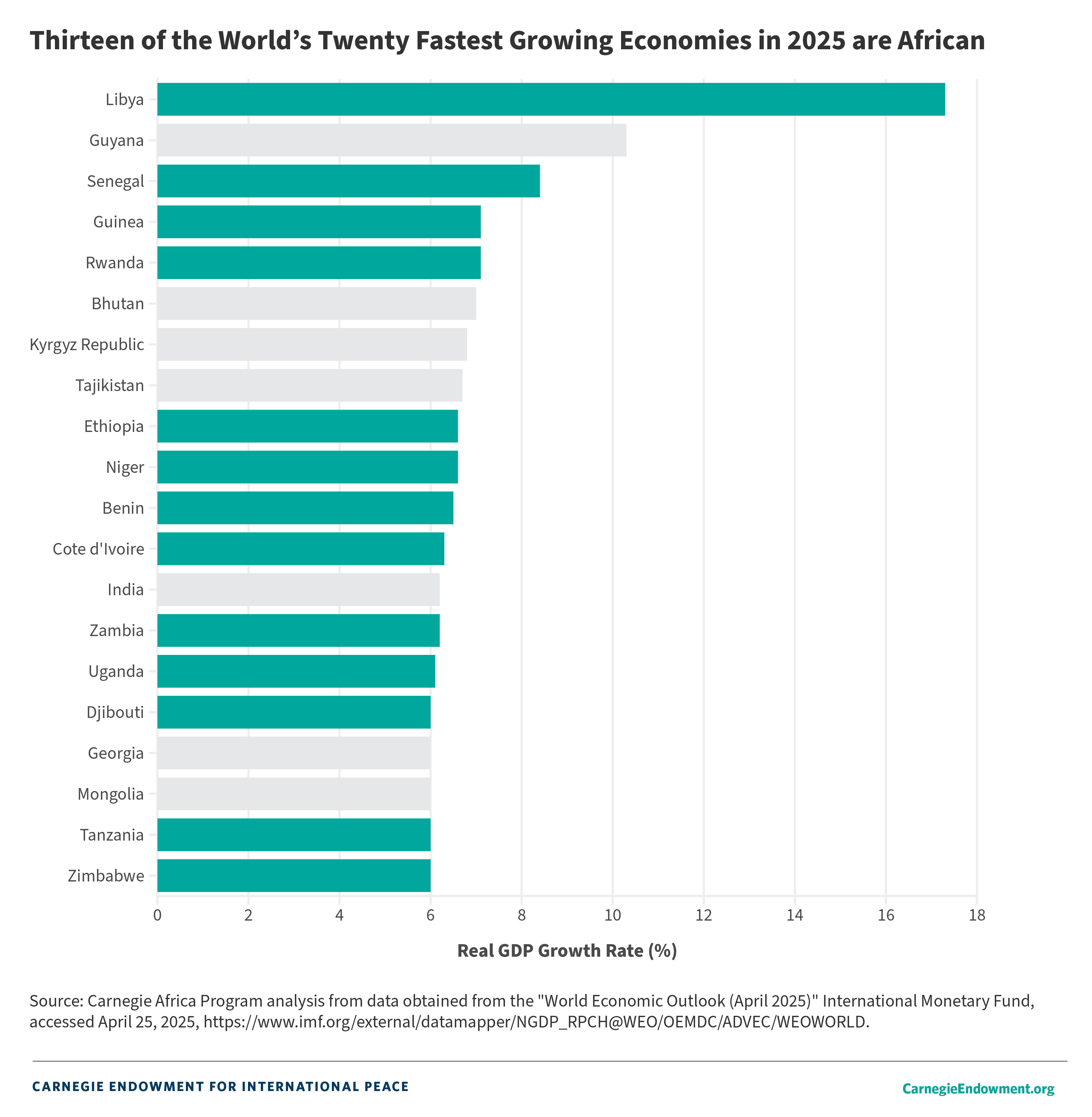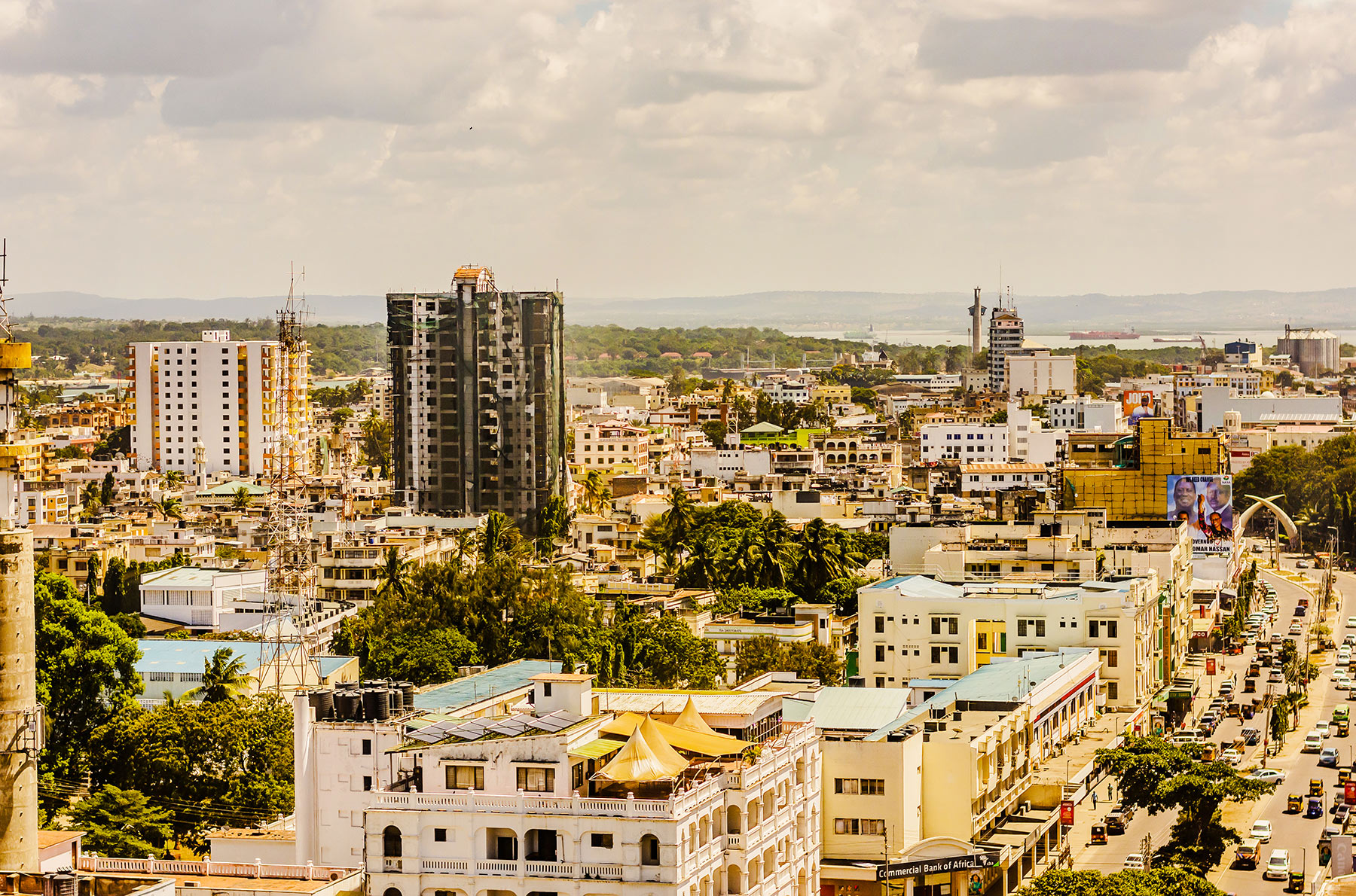April 2025
Dear friends,
Spring is in full swing here in D.C. and with the changing season are radical policy shifts. With uncertainties on the future of the African Growth and Opportunity Act as its expiration date looms in September, African leaders are trying to navigate the future of their trade relations with the U.S.
To further complicate matters, on April 2, President Donald Trump announced a flurry of “reciprocal” tariffs on imports from more than 180 countries across the world. Most countries were levied with a baseline universal 10% ad valorem duties, but others were impacted by higher, adjusted rates. Fifty African countries made the list with some receiving tariffs as high as 50 and 47 percent (Lesotho and Madagascar, respectively). The rates are derived from an unusual formula that takes the U.S.’s trade deficit with a particular country, divides it by the total imports from that country, then halves the quotient and multiplies it by 100. The resulting tariff rate left many African leaders scrambling for meetings with U.S. officials to negotiate bilateral deals or possible exemptions.
Even though the implementation of these tariffs has been suspended for 90 days until July 9th, the impact of the announcement is reverberating across the world. In the April 2025 World Economic Outlook, the IMF reduced global growth forecasts for 2025 to 2.8% primarily due to heightened trade policy uncertainties. It concludes that the trade war and declining international cooperation could further hinder the world’s growth prospects. The African continent is, of course, not immune to these global headwinds with several countries still recovering from Covid-19 shocks, battling cost-push inflation, and suffering heavy public debt burdens. Still, 13 of the world’s 20 fastest growing economies in 2025 are expected to be in Africa, according to IMF projections, as we show in our chart of the month below. This is encouraging but should not induce complacency as the need to sustain rapid growth rates to raise per capita incomes across the continent remains vital. And central banks play a pivotal role in macroeconomic stability and the broader goal of economic transformation in African countries. This was the subject of a private roundtable, we convened in partnership with the African Center for Economic Transformation, on the sidelines of the Spring Meetings. Read ACET’s paper on African Central Banks and the Challenges of Economic Transformation.
This year’s somewhat lowkey Spring Meetings were still interspersed with very conspicuous policy shifts in development financing and energy. U.S. Treasury Secretary Scott Bessent affirmed the administration’s commitment to working with the World Bank and the IMF “so long as they stay true to their mission”. This came as a relief to many experts who had expected an abrupt U.S. withdrawal from the Bretton Woods Institutions as recommended in the Project 2025 Mandate for Leadership blueprint. Bessent’s affirmation came with a clear admonishment for the institutions to “step back from their sprawling and unfocused agenda which have stifled their ability to deliver their core mandate”. This sprawling agenda includes climate, gender and social issues.
It is no surprise therefore that the World Bank president, Ajay Banga is adopting a more agnostic approach to accommodate a broader range of energy solutions to secure continued U.S. financial support. This agnosticism includes lifting the previous ban on lending for nuclear power projects and enabling increased financing for natural gas projects in LMICs —both energy sources that the Trump administration strongly supports. It is worth noting that between 2022 and 2023, the presidents of Uganda, Nigeria, Zambia and Angola decried the hypocrisy of global climate policies in which African countries were subject to a blanket ban on fossil fuels financing and were therefore unable to secure investments to develop their natural gas infrastructure while rich countries continued to consume record amounts of coal, oil and gas for domestic purposes. Many African policymakers are, therefore, likely to welcome this Trump-induced policy shift by the World Bank and yet, they should not be complacent in doubling down on fossil fuels production without plans for an eventual phaseout. Be on the lookout for my soon-to-be-published analysis of the opportunities and risks for African countries of this global policy reframe from energy transition to energy security.
Now zooming closer into U.S.-Africa relations, the broad contours of the Trump administration’s Africa policy are becoming visible. The administration announced Massad Boulos, businessman in West Africa and President Trump's in-law, as Senior Advisor for Africa. As the Trump Africa team begins to take shape, Boulos joins National Security Council Africa Co-Directors Brendan McNamara and Dan Dunham. In his official capacity, Boulos travelled to the Democratic Republic of the Congo, Rwanda, Kenya, and Uganda to meet with political and business leaders to advance efforts for durable peace in the DRC. And on April 25, Secretary of State Marco Rubio convened the Signing of a Declaration of Principles between the Government of the Democratic Republic of the Congo (DRC) and the Government of the Republic of Rwanda. The Declaration builds on the efforts of the African Union and other regional leaders to outline a “pathway to peace, stability, and integrated economic development in the eastern DRC region”. An important element here is the “minerals-for-security” deal between the DRC and the U.S., the discussions for which are still underway. Read the recent analysis on the deal’s prospects by nonresident scholar Geraud Neema.
Critical energy transition minerals are an important area of interest for both the U.S. and African countries. Earlier this month, in partnership with Embassy of the United Republic of Tanzania, we convened a private roundtable with ambassadors and diplomats from over 25 African embassies and the African Union mission in Washington D.C. to discuss strategies for navigating U.S. international engagement on critical resources. This builds on our ongoing work in this space. At the 2025 Investing in African Mining Indaba conference in Cape Town this February, the Africa Program brought together over 40 U.S. and African policymakers and private sector leaders for a private roundtable to brainstorm ideas on fostering collaborations between the United States and African countries premised on scientific and technical exchanges in the critical minerals and mining sectors. In our new policy brief, research analyst Alexander Csanadi and I distill the ideas from this roundtable into 10 key points on why and how the U.S. should leverage its technical expertise to increase collaborations with African countries. These ideas are percolating to the U.S. Congress as well. In April, Senators Coons, Cornyn, Hickenlooper and Young introduced a bill to allow “the Secretary of the Interior to enter into memoranda of understanding for the purpose of scientific and technical cooperation in the mapping of critical minerals and rare earth elements.” We will be watching this space closely.
On technology policy, the Africa Program was at the Global AI Summit in Kigali, Rwanda, earlier this month. Led by Dr. Jane Munga, the Africa Program, in partnership with Smart Africa, convened a high-level private workshop that featured two sessions: a ministerial session featuring African ICT ministers, and an expert panel featuring policy leaders. Shortly upon her return, Dr. Munga published her paper Beneath the Waves: Addressing Vulnerabilities in Africa’s Undersea Digital Infrastructure. In that paper, she lays out the vital role that undersea cables play in Africa's digital infrastructure, how vulnerable they can be, and the ways African governments can work together to safeguard their digital infrastructure.
This month, we also shared some professional development opportunities below. One that is particularly exciting is the call for applications for the new Mission 300 Fellowship program which aims to select 14 highly qualified citizens of African countries for a two-year fellowship position within governments on the continent to help expand energy access. As always, to stay updated, subscribe to our newsletter, follow us on LinkedIn, and follow us on X (formerly Twitter) at @AfricaCarnegie.
Sincerely,
Zainab Usman
Director, Carnegie Africa Program

Features
Beneath the Waves: Addressing Vulnerabilities in Africa’s Undersea Digital Infrastructure
Recent incidents demonstrated the vulnerability and fragility of Africa’s internet infrastructure and underscored the need for a robust and resilient agenda for this foundational digital infrastructure.
By Jane Munga
How to Advance U.S.-Africa Critical Minerals Partnerships in Mining and Geological Sciences
Various U.S. national security objectives could be advanced by developing collaborations with African countries premised on scientific and technical exchanges in the mining sector.
By Zainab Usman and Alexander Csanadi
DeepSeek R1: Implications of a New AI Era for Africa
The Chinese AI model demonstrates that powerful AI can be developed affordably, paving the way for broader and more equitable AI adoption.
By Sylvester Quansah
In the scramble for Africa’s critical minerals, the West must not abandon the ESG agenda
The race for minerals and metals crucial for the global energy transition is intensifying—and is increasing pressure on producing countries, including those in Africa.
By Zainab Usman and Rama Yade
U.S.–South Africa Relations Are on the Brink of Collapse
Even before Trump took office, the relationship between Washington and Pretoria was deteriorating. Now, it’s facing a complete rupture.
By Zainab Usman and Anthony Carroll
Developments on Our Radar
U.S. to End Vaccine Funds for Poor Countries [New York Times]
Zambia’s economy grows three times faster than IMF projections [Business Insider]
IMF predicts surge in African funding requests amid U.S. tariff fallout [Nairametrics]
South Africa seeks new US trade deal after tariff hike, says presidency [Reuters]
Tanzania lifts ban on agriculture imports from South Africa, Malawi [The East African]
Professional Development Opportunities
Congressional Black Caucus Foundation Fall 2025 Internship [application]
The ReNew Democracy Fellowship [application]
World Trade Organization Young Trade Leaders Programme [application]
Mission 300 Fellowship on Energy Access in Africa at ODI Global [application]
